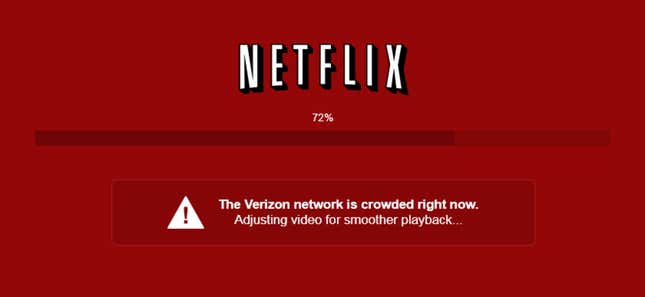
Netflix just responded to Verizon’s angry cease-and-desist letter in equally blunt language. The letter is pasted below. “Verizon’s unwillingness to augment its access ports to major internet backbone providers is squarely Verizon’s fault,” writes David Hyman, general counsel for the streaming video service.
Their dispute concerns an error message, pictured above, that Netflix is displaying to some customers blaming Verizon and other internet providers for poor video quality. Verizon called it misleading. Netflix said today that it would stop testing the message next week, but reserved the right to bring it back. In the meantime, Netflix download speeds for Verizon customers keep getting worse.
Here’s the letter from Hyman to Randy Milch, his counterpart at Verizon:
Dear Randy,
I am in receipt of your letter dated June 5, 2014.
Your interpretation mischaracterizes our messaging. The message you cite to in your letter merely lets our consumers know that the Verizon network is crowded. We have determined this by examining the difference between the speed at which the Verizon network handles Netflix traffic at peak versus non-peak times. The messaging is part of our ongoing transparency efforts to let consumers know their Netflix experience is being affected by congestion on their broadband provider’s network. We are testing this type of messaging across the US with multiple providers.
Furthermore, your attempt to shift blame for our customers’ experience on the Verizon network “squarely to Netflix itself” disregards Verizon’s responsibility to provide its customers with the service it has promised them. Verizon sells residential Internet access to its customers. In fact, it is my understanding that Verizon actually upsells customers to higher speed packages based on improved access to video services, including Netflix. Verizon’s unwillingness to augment its access ports to major Internet backbone providers is squarely Verizon’s fault. As an ISP, you sell your customers a connection to the Internet. To ensure that these customers get the level of service they pay you for, it is your responsibility to make sure your network, including your interconnection points, have sufficient capacity to accommodate the data requests made by those customers. To try to shift blame to us for performance issues arising from interconnection congestion is like blaming drivers on a bridge for traffic jams when you’re the one who decided to leave three lanes closed during rush hour.
As you are well aware, Netflix, for more than two years, through its Open Connect Program, has been willing to bring the data ISP subscribers request directly to any network for free, including Verizon. Despite our willingness to do so, you have chosen not to participate in the Open Connect Program, but instead have allowed your network connection to Netflix to degrade until we agreed to pay for augmented interconnection. We brought the data right to your doorstep…all you had to do was open your door.
We hope that our recent agreement will soon result in a better Netflix experience for our mutual customers. The current transparency test to which your letter relates is scheduled to end June 16 and we are evaluating rolling it out more broadly. Regardless of this specific test, we will continue to work on ways to communicate network conditions to our consumers. We’re also happy to work with you on ways to improve network transparency to our mutual customers.
Sincerely,
David Hyman
General Counsel